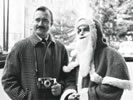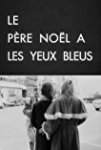Eye For Film >> Movies >> Santa Claus Has Blue Eyes (1966) Film Review
Santa Claus Has Blue Eyes
Reviewed by: Amber Wilkinson

Jean Eustache's second film - which he intended to be screened as a double-bill with his first short film Robinson's Place under the title Bad Company - was largely made due to the success of that film, which proved a critical hit in 1963. Admired by the Cahiers du Cinema, his first film concerning the life of a couple of blue collar 'likely lads' on the outskirts of Paris also caught the attention of Jean-Luc Godard. In fact, the Breathless director was so impressed that he gave Eustache his leftover film stock from his newly completed Masculine Feminine.
The result is Santa Claus Has Blue Eyes which, thematically, pretty much picks up where Robinson's Place left off, again exploring the life and driving influences of a young man on the fringes of the city. Like many men of a certain age, Daniel (Jean-Pierre Léaud) is less concerned with long-term goals and more preoccupied with getting enough cash in his pocket to buy a height-of-fashion duffel coat. This, in turn, will, he hopes, help him catch the attention of the local young women.

This notion of 'dressing to impress' is given a comedic twist when he is offered a job by a photographer who needs someone to pose on a corner in a Santa suit and be snapped by passers by.
As with Robinson's Place, Eustache is interested not just in his central character and narrative but in documenting the sights and sounds of Paris. As Daniel swings into Santa action, Eustache watches from a distance, seemingly letting the people of Paris become unwitting bit-part players in his film, as they stop to have their pictures taken.
It turns out that the Santa suit has an unexpected effect on the way people treat him - arguably a lot more of an influence, in fact, than his duffel coat prize - as it gives him a new aura of confidence and results in ladies letting him cuddle up to them and even agreeing to date.
This idea of legitimacy giving cover for more illicit practises - such as a quick grope - is also explored in Daniel's other job in a bingo hall, where he and other youths on the take occasionally pocket a handful of extra cash through sleight of hand. Eustache, however, is not out to condemn his character, but rather to shine a spotlight on a very specific point of life for many - where outward appearances, the presence of cash and the ability to pull a good looking girl are the chief driving forces.
There is a sense of creeping change rather than glorious revolution - even as Daniel begins to have a growing self-awareness, this need not necessarily lead to an immediate alteration of attitude towards life. So, as the film ends with cries of "Au bordel! Au bordel!" echoing out like the Hogmanay bells, it is clear that few changes are likely to be rung in with the new year.
Reviewed on: 23 Nov 2009
















